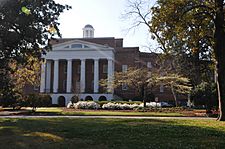South Carolina State Hospital facts for kids
Quick facts for kids South Carolina State Hospital |
|
|---|---|

Mills building in 2012
|
|
| Geography | |
| Location | South Carolina, United States |
| Organization | |
| Funding | Public hospital |
| Hospital type | Specialist |
| Services | |
| Beds | 410 |
| Speciality | Psychiatric |
| History | |
| Closed | December 2015 |
The South Carolina State Hospital was a special hospital in Columbia, South Carolina. It was run by the state government and helped people with mental health needs. It started in 1821 as the South Carolina Lunatic Asylum. This made it one of the first public hospitals for mental health in the United States.
The first building, called the Mills Building, was designed by a famous architect named Robert Mills. This building is now a very important historical site, known as a National Historic Landmark. By 1900, the hospital cared for over 1,000 patients. Over time, mental health care changed to focus more on helping people in their communities. Because of this, the main hospital closed in the late 1990s.
Some buildings on the campus were used for other patient services until the early 2000s. These were different parts of the state's mental health agency. For example, the William S. Hall Psychiatric Institute, which helped children and teens, stayed on the campus until 2015. It then moved to a new location. By January 2021, the entire property of the South Carolina State Hospital, also known as "Bull Street," was sold to private owners. The money from these sales is used to help patients of the mental health agency. For instance, $10 million was approved to create more community housing for patients.
Contents
History of the Hospital
How the Hospital Started
The idea for the South Carolina Lunatic Asylum became a law in 1821. It was only the second state hospital of its kind in the United States, after Virginia's. The first building was designed by Robert Mills. It was built between 1822 and 1827. This building had new ideas for safety and keeping patients secure.
At first, only patients who could pay were admitted. If a patient could not pay, their local government helped with the costs. Most patients were white, but some African-Americans were also admitted. This included enslaved people before 1848, when their admission was officially allowed.
Changes Over Time
In 1865, during the Civil War, the hospital was briefly used to hold prisoners. One famous prisoner, S. H. M. Byers, even hid in the hospital's attic when the city of Columbia was about to be captured.
The hospital grew bigger over the years. The Mills building was expanded, and new buildings were added. In 1892, the hospital started a nursing school, which taught people how to care for patients. This school closed in 1950. In 1896, the hospital's name changed to the South Carolina State Hospital for the Insane.
By 1910, the campus was very full. Like many hospitals at that time, it did not have enough money or staff. Patient care was also a challenge. Because of this, a second campus was opened north of Columbia for African-American patients. This campus was first called Palmetto State Hospital, then Crafts-Farrow Hospital. For many years, it helped older patients. Today, it houses many offices for the Department of Mental Health.
Modern Changes and Closure
Challenges with staff, money, and patient conditions continued into the 1900s. In the 1920s, the state began to shift mental health care. The goal was to help people in their own communities instead of large hospitals. By the 1980s, efforts increased to reduce the number of patients in the hospital.
In 1996, the two hospital campuses were combined. The hospital then had 410 beds. Buildings that were no longer used for patients became offices for the state Department of Mental Health. The historic Mills building was used by the Department of Health & Environmental Control.
Today, the Department of Health and Environmental Control still uses the Mills-Jarrett complex. The rest of the campus has been sold to a private company. The Department of Mental Health stopped using the site in December 2015. This was when the William S. Hall Children's Institute moved to a different campus. In September 2020, a fire damaged part of the central Babcock Building. However, developers are still working to turn it into apartments.
See also
- BullStreet District – A large area where the old hospital campus is being redeveloped into new homes and businesses.
- List of National Historic Landmarks in South Carolina
- National Register of Historic Places listings in Columbia, South Carolina

